Ecclesiastical New Year
For the maintenance of their armed forces, the Roman emperors decreed that their subjects in every district should be taxed every year. This same decree was reissued every fifteen years, since the Roman soldiers were obliged to serve for fifteen years. At the end of each fifteen-year period, an assessment was made of what economic changes had taken place, and a new tax was decreed, which was to be paid over the span of the fifteen years. This imperial decree, which was issued before the season of winter, was named Indictio, that is, Definiton, or Order. This name was adopted by the emperors in Constantinople also. At other times, the latter also used the term Epinemisis, that is, Distribution (Dianome). It is commonly held that Saint Constantine the Great introduced the Indiction decrees in A.D. 312, after he beheld the sign of the Cross in heaven and vanquished Maxentius and was proclaimed Emperor in the West. Some, however (and this seems more likely), ascribe the institution of the Indiction to Augustus Caesar, three years before the birth of Christ. Those who hold this view offer as proof the papal bull issued in A.D. 781 which is dated thus: Anno IV, Indictionis LIII -that is, the fourth year of the fifty-third Indiction. From this, we can deduce the aforementioned year (3 B.C.) by multiplying the fifty-two complete Indictions by the number of years in each (15), and adding the three years of the fifty-third Indiction. There are three types of Indictions: 1) That which was introduced in the West, and which is called Imperial, or Caesarean, or Constantinian, and which begins on the 24th of September; 2) The so-called Papal Indiction, which begins on the 1st of January; and 3) The Constantinopolitan, which was adopted by the Patriarchs of that city after the fall of the Eastern Empire in 1453. This Indiction is indicated in their own hand on the decrees they issue, without the numeration of the fifteen years. This Indiction begins on the 1st of September and is observed with special ceremony in the Church. Since the completion of each year takes place, as it were, with the harvest and gathering of the crops into storehouses, and we begin anew from henceforth the sowing of seed in the earth for the production of future crops, September is considered the beginning of the New Year. The Church also keeps festival this day, beseeching God for fair weather, seasonable rains, and an abundance of the fruits of the earth. The Holy Scriptures (Lev. 23:24-5 and Num. 29:1-2) also testify that the people of Israel celebrated the feast of the Blowing of the Trumpets on this day, offering hymns of thanksgiving. In addition to all the aforesaid, on this feast we also commemorate our Saviour's entry into the synagogue in Nazareth, where He was given the book of the Prophet Esaias to read, and He opened it and found the place where it is written, "The Spirit of the Lord is upon Me, for which cause He hath anointed Me..." (Luke 4:16-30).
It should be noted that to the present day, the Church has always celebrated the beginning of the New Year on September 1. This was the custom in Constantinople until its fall in 1453 and in Russia until the reign of Peter I. September 1 is still festively celebrated as the New Year at the Patriarchate of Constantinople; among the Jews also the New Year, although reckoned according to a moveable calendar, usually falls in September. The service of the Menaion for January 1 is for our Lord's Circumcision and for the memorial of Saint Basil the Great, without any mention of its being the beginning of a new year.





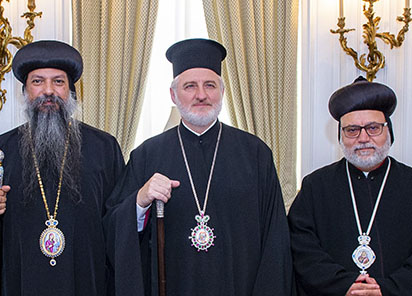 NEW YORK – His Eminence Archbishop Elpidophoros met today, Monday, August 12, 2019, with a delegation from the Standing Conference of Oriental Orthodox Churches
NEW YORK – His Eminence Archbishop Elpidophoros met today, Monday, August 12, 2019, with a delegation from the Standing Conference of Oriental Orthodox Churches
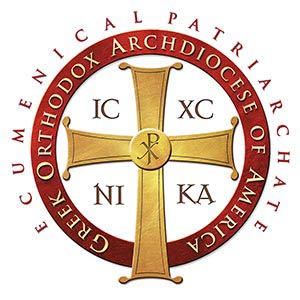 The Greek Orthodox Archdiocese of America is pleased to announce that the audit of the financial statements for the year ended December 31, 2018 has been completed. (See financial statements here). The completion of these financial statements confirms that progress in financial accountability is improving as this is the earliest after a year end in over 15 years that audited financial statements have been made available.
The Greek Orthodox Archdiocese of America is pleased to announce that the audit of the financial statements for the year ended December 31, 2018 has been completed. (See financial statements here). The completion of these financial statements confirms that progress in financial accountability is improving as this is the earliest after a year end in over 15 years that audited financial statements have been made available.
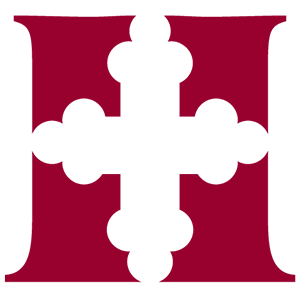 The Board of Trustees seeks a dynamic, visionary and strategic leader to serve as President of Hellenic College Holy Cross Greek Orthodox School of Theology. The candidate must be a practicing Orthodox Christian who possesses strong leadership, administrative, fund-raising and institutional advancement skills and will be an effective communicator with the institution’s internal and external constituencies.
The Board of Trustees seeks a dynamic, visionary and strategic leader to serve as President of Hellenic College Holy Cross Greek Orthodox School of Theology. The candidate must be a practicing Orthodox Christian who possesses strong leadership, administrative, fund-raising and institutional advancement skills and will be an effective communicator with the institution’s internal and external constituencies.
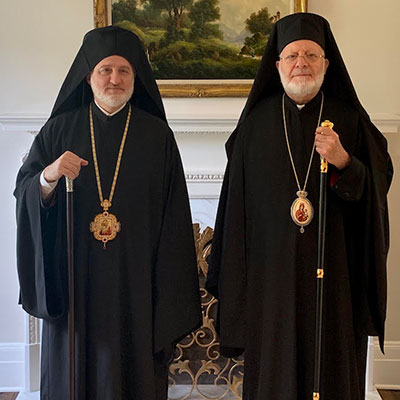 Archbishop Elpidophoros was received August 22, 2019, by Metropolitan Joseph for their first official visit at the headquarters of the Antiochian Orthodox Christian Archdiocese of North America. The two hierarchs discussed the various practical, pastoral, and ecclesial matters pertaining to the Orthodox Christian community in the United States of America.
Archbishop Elpidophoros was received August 22, 2019, by Metropolitan Joseph for their first official visit at the headquarters of the Antiochian Orthodox Christian Archdiocese of North America. The two hierarchs discussed the various practical, pastoral, and ecclesial matters pertaining to the Orthodox Christian community in the United States of America.
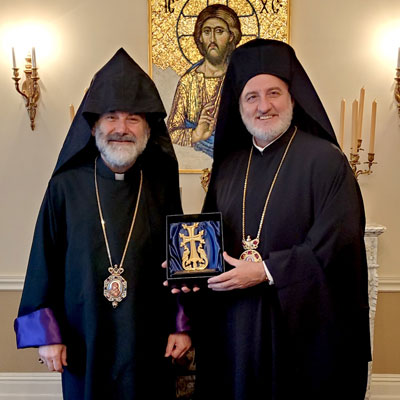 On Tuesday, August 20, 2019, Archbishop Elpidophoros met with Archbishop Anoushavan Tanielian, Prelate of the Eastern Prelacy of the Armenian Apostolic Church under the jurisdiction of the Holy See of the Great House of Cilicia.
On Tuesday, August 20, 2019, Archbishop Elpidophoros met with Archbishop Anoushavan Tanielian, Prelate of the Eastern Prelacy of the Armenian Apostolic Church under the jurisdiction of the Holy See of the Great House of Cilicia.
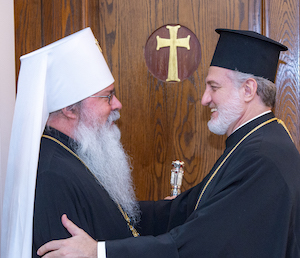 NEW YORK – Archbishop Elpidophoros received today Metropolitan Tikhon of the Orthodox Church in America (OCA) for their first official visit. The two hierarchs discussed the developing relationship between the Archdiocese and the OCA in recent years, committing to deepening cooperation.
NEW YORK – Archbishop Elpidophoros received today Metropolitan Tikhon of the Orthodox Church in America (OCA) for their first official visit. The two hierarchs discussed the developing relationship between the Archdiocese and the OCA in recent years, committing to deepening cooperation.